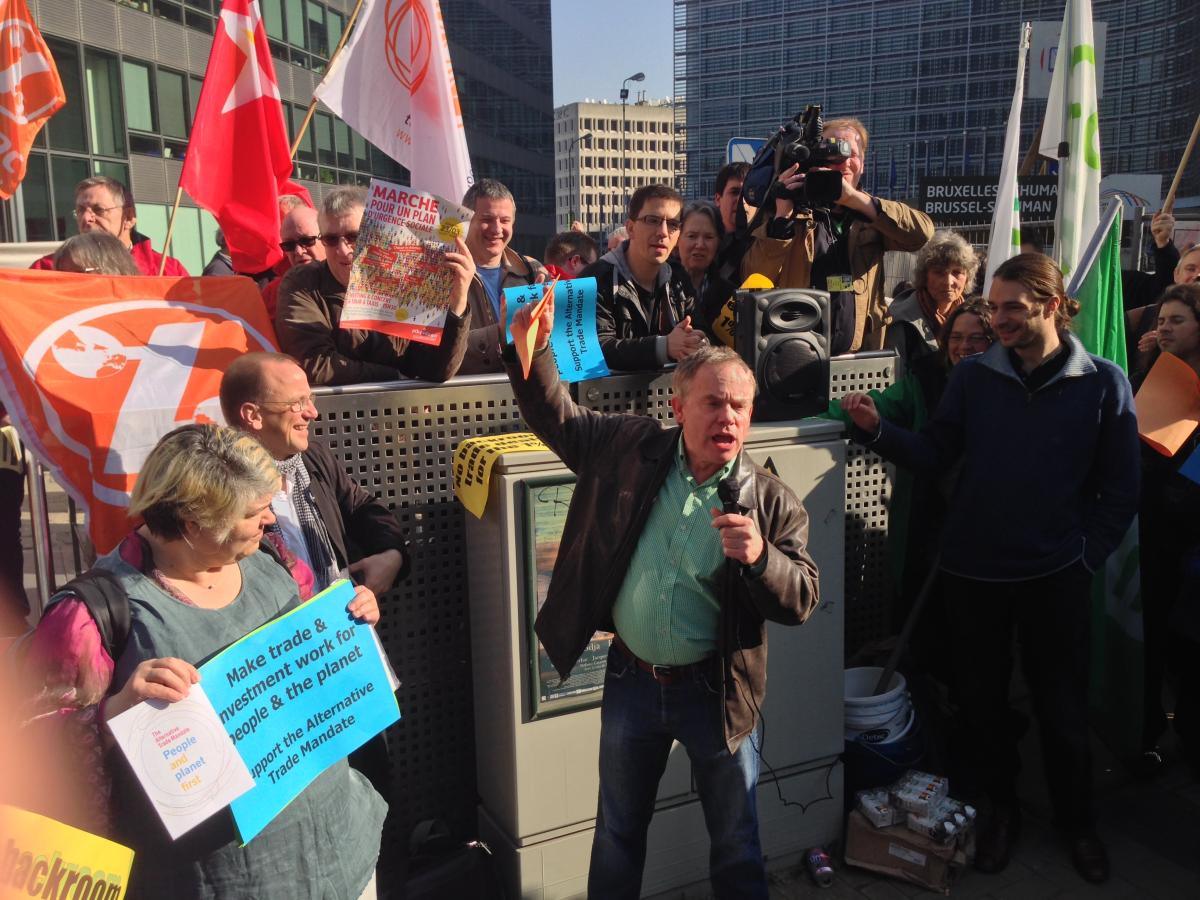When Canadian politicians go to Europe it’s often to sell them something they don’t want to buy.
Like Leona Aglukkaq, Canada’s northern development minister, who told a WTO appeals body meeting in Geneva yesterday that letting the EU ban seal products for moral reasons sets a dangerous precedent for world trade. Or Natural Resources Minister Joe Oliver, who was in Brussels (again) this January to deride the fraught Fuel Quality Directive for “singling out Canada’s oil sands–derived fuels without sound scientific justification.”*
Something similar could be said for my trip to Brussels and Berlin this past week. On behalf of the Council of Canadians and the Trade Justice Network, I am selling the idea that the growing number of Europeans worried about a U.S.-EU free trade deal should keep its little Canadian buddy (CETA) in sight at all times. In so many ways they are the same agreement, and with new CETA leaks available at eu-secretdeals.info, the European public can see where the TTIP might head in controversial areas like regulatory co-operation and, especially, investment protection.
As I suspected before getting on the plane, this was not a difficult sales job. Defeating CETA is already on the agenda of many of the labour, environmental, agricultural and consumer groups who organized a two-day transatlantic conference last week in Brussels. An impressive number of German politicians from many different parties think it’s a good idea as well, as I’m learning in meetings at the Bundestag yesterday and today.**
To use a (probably awkward) video game metaphor, CETA has gone from an optional side mission to full-fledged level in what we could call Grand Theft Auto TTIP™. The environment is the international neoliberal order that benefits only the corporate 1 per cent. The protagonist is a resurgent anti-globalization movement whose avatar might predictably wear a black mask but who in fact looks more like this guy (pictured), a Nobel prize-winning former chief economist of the World Bank.
 Joseph Stiglitz has been openly critical of that other big deal, the Trans-Pacific Partnership, for some time but he might have upped his game this week when he stated bluntly in the New York Times that, “All over the world, trade ministries are captured by corporate and financial interests,” and that “Critics of the TPP are so numerous because both the process and the theory that undergird it are bankrupt.”
Joseph Stiglitz has been openly critical of that other big deal, the Trans-Pacific Partnership, for some time but he might have upped his game this week when he stated bluntly in the New York Times that, “All over the world, trade ministries are captured by corporate and financial interests,” and that “Critics of the TPP are so numerous because both the process and the theory that undergird it are bankrupt.”
He concludes his article: “Trickle-down economics is a myth. Enriching corporations — as the TPP would — will not necessarily help those in the middle, let alone those at the bottom.” It is lost on very few people that the same would be true for the TTIP.
And really where can social democrats or even liberals go after Stiglitz to defend the transatlantic and transpacific dreams of regulatory convergence and corporate enforcement of trade and investment rules through investor-state dispute settlement? When a conservative government in Germany says no to ISDS in the EU-U.S. TTIP, and the world’s largest trade union wants the negotiations frozen completely, what hope can the Harper government possibly have of getting CETA passed the finishing line in Europe?
The fate of the Canada-EU agreement is still uncertain. Canada’s big-business lobby understands this and seems worried. The Chamber of Commerce told a parliamentary trade committee meeting last week, “it’s soon time to stop patting ourselves on the back. There’s a lot of hard work ahead to get CETA implemented within a reasonable timeframe, and to make sure that Canadian businesses can fully exploit the benefits of the agreement.”
The Chamber explained that negotiations on CETA continue, that once they conclude it will take as long as a year to scrub the text and translate it into all EU languages, and that full ratification in Europe after this point can take up to two years. The implication is that the federal government will need to champion CETA for a long while, past this year’s European parliamentary elections, possibly past Canadian elections (and a new government) in 2015.
The TTIP talks will compete for attention during this time, and a concluded EU-U.S. deal (if that ever happens) would substantially alter the Canada-EU trade relationship, which is why the Chamber recommends close corporate and government co-operation to keep Europeans and Canadians interested. Not only that, they are thinking ahead to the potential merger of CETA and TTIP:
Canada should push the American government and European Commission to ensure that the TTIP lives up to its name and contributes to the creation of a seamless trade relationship between all of North America and Europe. Canada should join Mexico — which has its own trade agreement with the Europe Union — and propose solutions to ensure compatibility between the different treaties.
After witnessing firsthand the European enrollment in an anti-TPP army, the Chamber’s advice reads like pure fantasy. We can see for ourselves how many unfinished paragraphs there are in many of the CETA chapters. Last week, the director responsible for investment at the Commission admitted they are having second thoughts about key language in the investment protection rules. A Commission public debate on ISDS in the U.S. deal has not yet started, and more than 14,000 people have signed an ATTAC Germany petition demanding an end to TTIP and CETA negotiations.
The Conservatives in Ottawa may soon conclude a free trade deal with Korea but their much more precious EU agreement is stuck. An expanding public awareness of the failure of corporate trade deals will make it more difficult to sell CETA as a win for Canada while ensuring more recruits to the TTIP and CETA fights in Europe. The federal sales job will be long, expensive and, quite possibly, without a final handshake.
* By assigning a higher carbon-content value to tar sands-derived fuel than convention oil, because tar sands crude literally has a higher carbon content than conventional oil, the FQD could potentially block Canadian exports to the continent.
** Many thanks to the Rosa Luxemburg Foundation for inviting me and Council of Canadians Executive Director Garry Neil to be part of the Brussels meetings, and to PowerShift Germany and the Forum Umwelt und Entwicklung for organizing all the meetings in Berlin.
Photo: Mike Dolan of the International Brotherhood of Teamsters addresses a crowd of 350 anti-TTIP protesters outside the European Commission in Brussels, March 13, 2014



